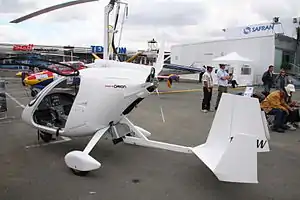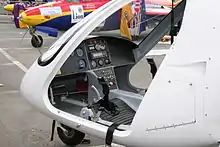Magni M-24 Orion
The Magni M-24 Orion is an Italian sport autogyro, seating two side-by-side in an enclosed cabin. It was designed and produced by Magni Gyro srl of Besnate.
| M-24 Orion | |
|---|---|
 | |
| Role | Two seat autogyro |
| National origin | Italy |
| Manufacturer | Magni Gyro srl, Besnate |
| First flight | 2008 |
| Status | in production |
| Number built | >15 |
| Developed from | XM-23 Orion |
Design and development
Magni Gyro currently produces five sport autogyro models, all with similar pod and low boom, pusher engine layouts and the M-24 Orion have side by side seating and an enclosed cabin. It has a steel airframe with a carbon fibre cabin and engine-enclosing pod. Transparent, top hinged doors on either side give access to the two seats, which are slightly staggered to make the most of the cabin width. The 2-bladed rotor, mounted on a mast above the pod, is of composite construction.[1]
An 85 kW (114 hp) Rotax 914ULS flat four engine is mounted at cabin-top height and drives a 3-bladed pusher propeller. Below it, the slender flat-sided boom carries the fibreglass empennage, which consists of a swept horizontal stabilizer with end-plate fins and a larger, central, fin and rudder. The Orion has a tricycle undercarriage with the faired mainwheels, fitted with brakes, on spring cantilever legs. The nosewheel is unfaired.[1]
The Orion's immediate precursor is the XM-23 Orion, which first flew on 1 February 2007, but both share many components with the tandem, open cockpit M-16 and M-22.[1]
Operational history

The Orion was first seen in public in August 2008 and a pre-production run of 10 aircraft was initiated that autumn, with full-scale production starting in 2009.[1]
By mid-2010 there were 11 Orions on the mainland European (Russian excluded) registers, the majority in France.[2] UK type approval was reached in 2010,[3] 4 aircraft are currently (November 2010) on the UK register,[4] and at least one on Canadian register.[5]
Variants
- M-16 Tandem Trainer
- tandem open two seat autogyro
- M-22 Voyager
- touring version of the M-16
- M-23 Orion
- one-off enclosed side-by-side development of the M-16 series
- M-24 Orion
- production version of the M-23 Orion
- M-26
- incremental development of the M-16 series
Specifications
Data from Jane's All the World's Aircraft 2010/11[1]
General characteristics
- Capacity: 2
- Length: 4.33 m (14 ft 2 in) overall
- Height: 2.80 m (9 ft 2 in)
- Empty weight: 285 kg (628 lb)
- Max takeoff weight: 450 kg (992 lb) European ultralight limit (USA:550 kg)
- Fuel capacity: 82 L (18.0 Imp gal; 21.7 US gal)
- Powerplant: 1 × Rotax 914ULS flat four, 85 kW (114 hp)
- Main rotor diameter: 8.23 m (27 ft 0 in)
- Main rotor area: 53.20 m2 (572.6 sq ft)
- Propellers: 3-bladed Arplast, ground adjustable pitch, 1.70 m (5 ft 7 in) diameter
Performance
- Maximum speed: 194 km/h (121 mph, 105 kn)
- Cruise speed: 145 km/h (90 mph, 78 kn)
- Service ceiling: 4,000 m (13,000 ft) service
- Rate of climb: 5.0 m/s (980 ft/min) at sea level
References
- Jackson, Paul (2010). Jane's All the World's Aircraft 2010-11. Coulsdon, Surrey: IHS Jane's. pp. 396–7. ISBN 978-0-7106-2916-6.
- Partington, Dave (2010). European registers handbook 2010. Air Britain (Historians) Ltd. ISBN 978-0-85130-425-0.
- "Magni UK". Retrieved 2010-11-18.
- "CAA M-24 registrations". Retrieved 2010-11-18.
- "RegoSearch | C-GJNO Canadian Aircraft Registration Details". www.regosearch.com. Retrieved 2020-06-16.